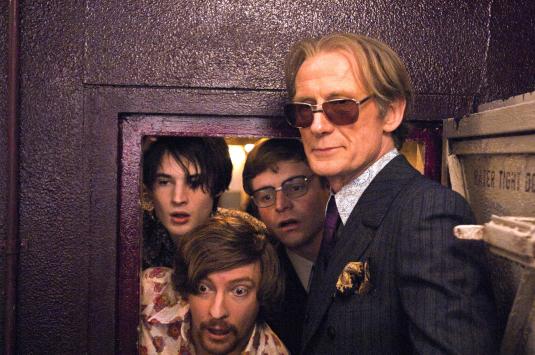An interview with writer/director Richard Curtis and actor Tom Sturridge
By Brandon Kosters
 Pirate Radio, an enjoyable two hour long advertisement for its own soundtrack, loads Phillip Seymour Hoffman, Bill Nighy, Nick Frost, the squirrelly guy from Flight of the Conchords (a.k.a. Rhys Darby), and four other people into a boat in the year 1966. They are broadcasting rock and roll music illegally throughout the U.K,. much to the dismay of government minister Dormandy (Kenneth Branagh).
Pirate Radio, an enjoyable two hour long advertisement for its own soundtrack, loads Phillip Seymour Hoffman, Bill Nighy, Nick Frost, the squirrelly guy from Flight of the Conchords (a.k.a. Rhys Darby), and four other people into a boat in the year 1966. They are broadcasting rock and roll music illegally throughout the U.K,. much to the dismay of government minister Dormandy (Kenneth Branagh).
The film is something of a departure from Curtis’ romantic comedies. “I used to be obsessed with love,” Curtis said, “and now I’ve just been going out with this girl for so long.” He is behind the scripts of Four Weddings and a Funeral and Bridget Jones’s Diary. This is his second outing as both writer and director, Love Actually having been his first.
He was motivated to return to another lifelong obsession: “pop music. Since the age of seven, I can tell you what the top pop songs are in England.”
Curtis wanted to break away from what he calls the “traditional format” of films about rock and roll: “Guy joins band, injects heroin into his eyeballs…reunion tour…I didn’t want to do that.”
Curtis initially drew inspiration from his experience listening to pirate radio as an English child in the sixties and his “imaginative idea” about the experiences of the men aboard the boat. The film ultimately became “more about my twenties. There’s this period after university where you move into a shabby apartment with too many other guys. One of whom has had sex with everybody. One of whom has never had sex. The food is bad, and you listen to music all day long.”
It’s about “that time in one’s life when money doesn’t matter so much and you don’t have any children.”For Curtis, this period of his life was in Camden in 1972, listening to artists like the Specials and Madness.
Tom Sturridge stars in the film as Carl, the godson of the ship’s captain Quentin (Bill Nighy). Carl has recently been expelled from school for smoking marijuana. His mother sent him on board the ship, which she believed would help get his life on the right track.
Sturridge describes his role in the film as “the eyes of the audience.” His character is “a way of getting people into this world. Essentially a voyeur…”
Sturridge spoke fondly of filming the movie in close quarters. “It was kind of magical to be on a boat in the summer with Dylan, Van Morrison, and the Rolling Stones… It was a beautiful way to spend the summer.”
While Curtis is primarily a writer, and everything was scripted, Sturridge said that “At the end of every scene, the cameras continued rolling…sometimes for hours.” With the “7-8 different principle parts in the same room, so much of it was just improvised. People would be roaming around filming whatever was the most interesting.”
The original cut of the film was five-and-a-half hours long. The version that screened in the U.K. was 135 minutes, and the U.S. version has been cut down to 116 minutes.
In the film, the government is targeting obscenity. Intellectual property rights are (not surprisingly) not acknowledged, which begs the question: How might the issue of illegally sharing music from a boat in the 60’s be different from illegally downloading music today? Sturridge thinks that “what’s so different is the unification of an audience…and listening to one person speaking. I think it’s very different having these mentors teach you and lead you…If I go onto the internet to [find music]…you go through these pointless journeys.” He does believe that it’s a “beautiful thing” that independent artists have the means to produce and distribute their music, but “what we’ve lost is not quality control, but guides through the mess of music.”
Pirate Radio speaks the same trite language about the subversive quality of rock and roll uniting cool kids and alienating the pasty-faced meanies. The same language that has been co-opted by the pasty-faced meanies in every major corporate institution in the western hemisphere to peddle crap like clocks with images from Pink Floyd album covers. It’s the same corny idealization of the decadent abandon of the sixties, but it’s also lots of fun (both the film, and decadent abandon).
What for Curtis, is the central message of Pirate Radio? “If there’s a meaning to the film, it’s that God gave rock and roll to all of us, and we’re lucky to have it.”
(left-right) Tom Sturridge, Rhys Darby, William Adamsdale, and Bill Nighy.







[…] Pirate Radio, and Up in the Air By brandonkosters Leave a Comment Categories: Uncategorized I just interviewed Richard Curtis this week for Pirate Radio, which was released in the U.S. today. It was a joy sitting down with him. I also got to talk with Tom Sturridge who stars in the film. Check it out here. […]